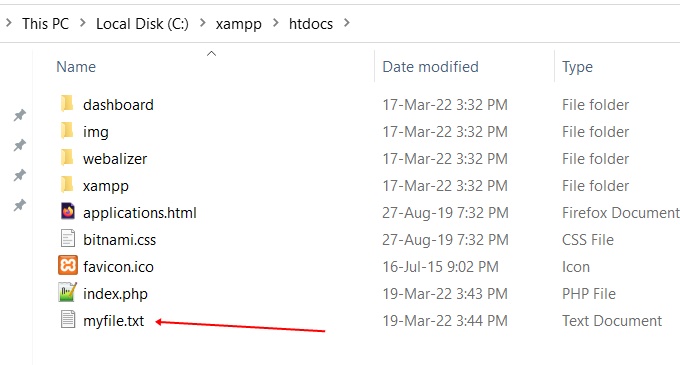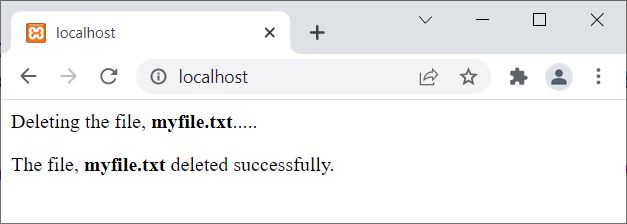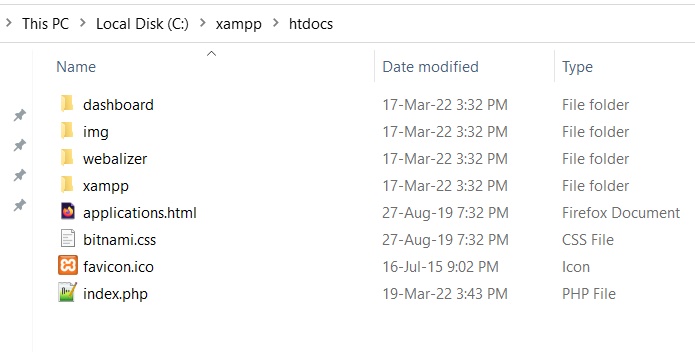- PHP Basics
- Learn PHP
- PHP Comments
- PHP Data Types
- PHP Variables
- PHP Operators
- PHP echo
- PHP print
- PHP echo vs. print
- PHP if else
- PHP switch
- PHP for Loop
- PHP while Loop
- PHP do...while Loop
- PHP foreach Loop
- PHP break and continue
- PHP exit()
- PHP exit() vs. break
- PHP isset()
- PHP Arrays
- PHP print_r()
- PHP unset()
- PHP Strings
- PHP Functions
- PHP File Handling
- PHP File Handling
- PHP Open File
- PHP Create a File
- PHP Write to File
- PHP Read File
- PHP feof()
- PHP fgetc()
- PHP fgets()
- PHP Close File
- PHP Delete File
- PHP Append to File
- PHP Copy File
- PHP file_get_contents()
- PHP file_put_contents()
- PHP file_exists()
- PHP filesize()
- PHP Rename File
- PHP fseek()
- PHP ftell()
- PHP rewind()
- PHP disk_free_space()
- PHP disk_total_space()
- PHP Create Directory
- PHP Remove Directory
- PHP Get Files/Directories
- PHP Get filename
- PHP Get Path
- PHP filemtime()
- PHP file()
- PHP include()
- PHP require()
- PHP include() vs. require()
- PHP mysqli Tutorial
- PHP mysqli Tutorial
- PHP and MySQL Setup
- PHP mysqli: Create Database
- PHP mysqli: Create Table
- PHP mysqli: Insert Record
- PHP mysqli: Update Record
- PHP mysqli: Fetch Record
- PHP mysqli: Delete Record
- PHP mysqli: SignUp Page
- PHP mysqli: LogIn Page
- PHP mysqli: Store User Data
- PHP mysqli Functions
- PHP mysqli_connect()
- PHP mysqli_close()
- PHP mysqli_connect_errno()
- PHP mysqli_connect_error()
- PHP mysqli_query()
- PHP mysqli_fetch_row()
- PHP mysqli_fetch_assoc()
- PHP mysqli_fetch_array()
- PHP mysqli_free_result()
- PHP mysqli_error()
- PHP mysqli_prepare()
- PHP mysqli_stmt_bind_param()
- PHP mysqli_stmt_execute()
- PHP mysqli_stmt_fetch()
- PHP mysqli_stmt_store_result()
- PHP mysqli_stmt_num_rows()
- PHP mysqli_stmt_bind_result()
- PHP mysqli_stmt_get_result()
- PHP mysqli_result class
- PHP mysqli_report()
- PHP error_reporting()
- PHP mysqli_real_escape_string()
- PHP htmlspecialchars()
- PHP Misc Topics
- PHP Object Oriented
- PHP new Keyword
- PHP header()
- PHP getallheaders()
- PHP Cookies
- PHP Sessions
- PHP Date and Time
- PHP GET vs. POST
- PHP File Upload
- PHP Image Processing
PHP unlink() Function: Delete a File
The PHP unlink() function is used when we need to delete or remove a file. For example:
<?php
if(unlink("codescracker.txt"))
echo "The file deleted successfully";
else
echo "Unable to delete the file";
?>
The output of the above PHP example is:

And the file named codescracker.txt that was available in the current directory has been deleted, after executing the above PHP code.
PHP unlink() Function Syntax
The syntax of the unlink() function in PHP is:
unlink(file, context)
The second, or context, parameter is optional and is used to define the context of the file handler.
Note: The unlink() function returns TRUE on success and FALSE on failure.
PHP unlink() Function Example
Before deleting any file using PHP script, let me show you the snapshot of the current directory, in my case:

Now here is the PHP script to delete a file named myfile.txt:
<?php
$file = "myfile.txt";
echo "<p>Deleting the file, <b>$file</b>.....</p>";
if(unlink($file))
echo "<p>The file, <b>$file</b> deleted successfully.</p>";
else
echo "<p>Unable to delete the file, <b>$file</b></p>";
?>
The output of the above PHP example after execution is:

Following is the new snapshot of the same directory after executing the above PHP script to delete a file named myfile.txt:

Advantages of the unlink() function in PHP
- The unlink() function is very simple to use, requiring only the file path as an argument.
- The unlink() function is extremely efficient because it deletes the file from the file system without opening it.
- The unlink() function deletes files in a flash and requires few system resources.
Disadvantages of the unlink() function in PHP
- Unlike move to trash(), unlink() permanently deletes the file. The file cannot be recovered once it has been deleted.
- The unlink() function deletes the file without requesting confirmation from the user. This can be risky, particularly when deleting important files. However, you can implement the confirmation request manually using PHP code.
- important files or even system files inadvertently, posing serious security risks.
- The unlink() doesn't provide any error handling. If the file path is incorrect, the function will silently fail, making troubleshooting difficult.
« Previous Tutorial Next Tutorial »